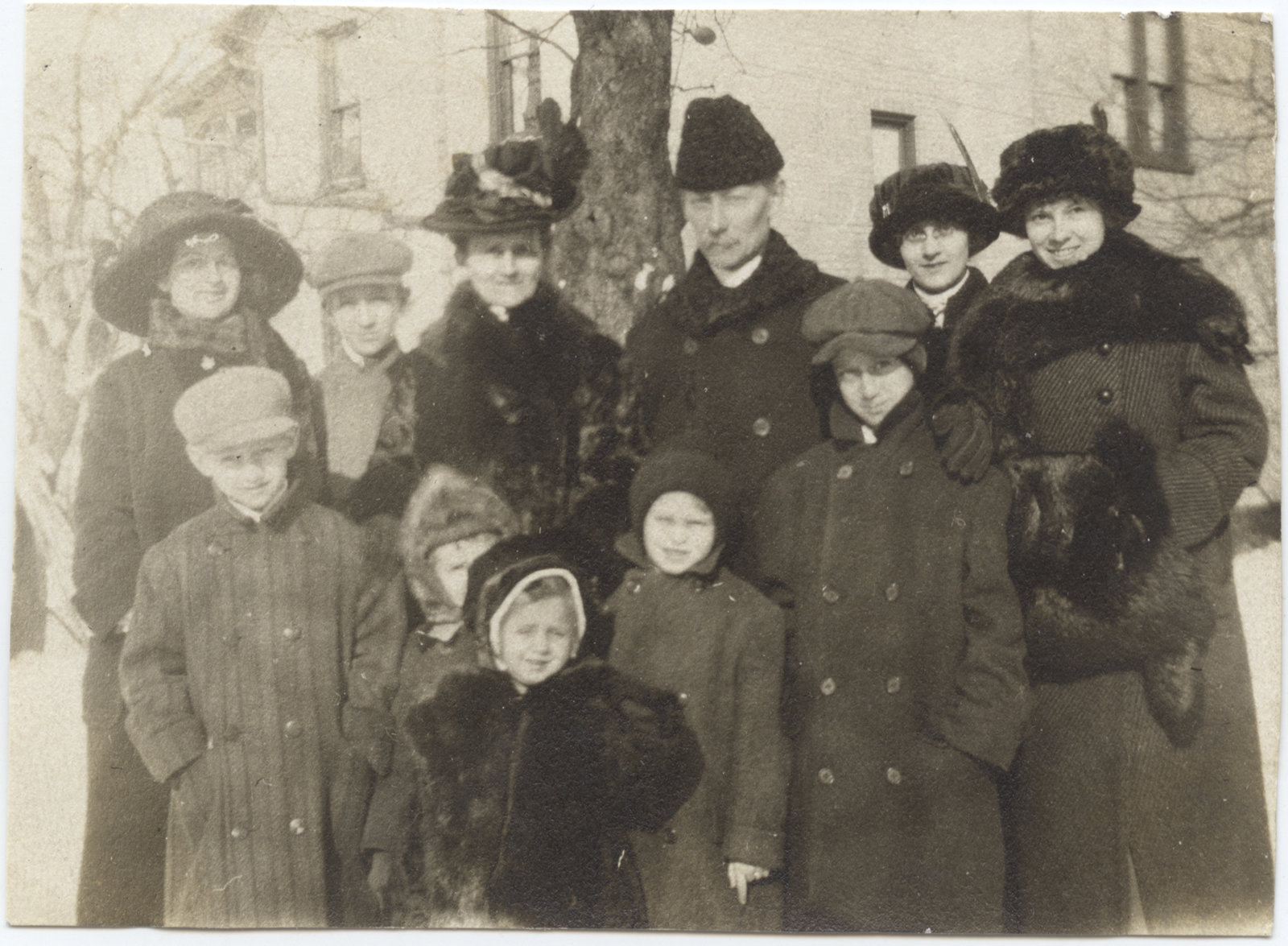
Carl Reinhold Tappert was born in Germany and grew up as its 19th Century imperialism swelled. He trained at the Kropp Seminary in Schleswig-Holstein, and at 22, he immigrated to the United States where he was ordained. Early in 1913, the 46-year-old reverend moved his wife and eight children from Meriden, Connecticut, to Berlin, Ontario. They were on the precipice of a new faith-focussed life in a young country: he joined Waterloo Lutheran Seminary’s fledgling faculty (Wilfrid Laurier University’s founding institution) and was St. Matthew’s Lutheran Church’s new pastor.
The first hints of concern began roughly about a year and a half after he arrived. About a month after war was declared, Tappert publicly questioned the credibility of the anti-German propaganda that circulated—how could the land of his birth be the monster the British said it was? He also resisted local social pressures. When Berliners opened their purses and wallets at rates unmatched elsewhere in the Dominion, he refused the Patriotic Fund. He told his children to keep silent as their schoolmates sang God Save the King. Soon word buzzed about town that he used the pulpit to pray for Prussian progress. Before long, he was hauled before Berlin’s police chief to answer to these and other rumours. No charges were laid, and Tappert demanded (and received) an apology from the Chief Commissioner of the Canadian Police.
Other men might have kept their heads down after such an encounter. Not Tappert. He continued to engage in debates and discourses about Germany’s economy and politics. His outspokenness may have comforted some, but he sounded treasonous to others. He didn’t seem to understand his dispassionate discourse was not wanted in an impassioned time.
Saturday 4 March: Now that we’ve found where the enemy is lurking
After the 118th Battalion sacked the Concordia Club, Colonel Lochead cancelled all permanent passes. Whether or not this was still in effect, I don’t know, but 30-50 soldiers met up with Sergeant-Major Blood in Berlin’s downtown. They were consternated by the minister’s continued presence—for a couple of weeks, Lochead said the pastor would leave town, but he was still at the parsonage. The men had a mind to visit him to “find out why he had not left the city on March 1st as he had promised.” Blood joined in to hear from Tappert himself.
At 10:30 pm a crowd of soldiers and civilians appeared at the parsonage. The next morning 20 people were to be confirmed, and Tappert was in his study, reviewing his morning sermon.
The soldiers leaned on the doorbell.
The Tapperts, afraid the soldiers’ threats would be manifest, didn’t let them in. The barred men shouted for entry as the pastor tried to telephone the police. The rabble smashed through the door and poured into the house. They ripped the phone from the wires and commanded the 49-year-old outside. He refused. They tried to force him out. Again, he resisted. This time, they floored him and battered him about the head. His wife went for the phone, but she and the children were “roughly handled” as they tried to defend the reverend.
The men grabbed Tappert’s hands and feet and kicked him as revenge for his resistance. They set him on his feet and marched him through the downtown to the barracks. The soldiers intended to keep their captive in the guardroom, but officers ended the escapade and escorted the minister home.
Sunday 5 March: Sunday Service
A battered and bruised Reverend Tappert performed St. Matthew’s Morning Service, with a number of the 118th in attendance. His right eye blackened, he was shy one tooth, had facial lacerations and a long cut along the back of his head. God Save the King ended the service.
Monday 6 March: In Magistrate Weir’s police court
Magistrate Weir was no stranger to the 118th’s antics, as he presided over other soldiers’ appearances. On this occasion, Blood and Pte. Schaefer appeared on charges of aggravated assault with intent to do harm to Reverend Tappert.
Tappert bore Saturday night’s badges (The News-Record described him as “mussed up”). He told the court that a soldier claimed to be “acting under higher orders” when confronted by the officers at the barracks, and commented “Mr. Lochead has got cold feet again,” when told to let the pastor alone.
Police Constables Sachs and Desmond said they followed the crowd to Tappert’s house. When they got there, Sachs warned the gang “to go easy as Tappert was an American citizen and that if damage was done, serious international complications might result.” The soldiers said they weren’t there to harm Tappert but to “find out why he had not left the city on March 1st as he had promised.”
Schaefer corroborated Blood’s testimony: Blood understood the “mission was intended to be a peaceable one.” There was no “violent doorbell ringing” as Tappert claimed but, in reality, the soldiers “asked” to be let into the house. The pastor’s refusal and his defiant attitude (he said he was an American citizen and would leave when ready) “eliminated the desire on the part of the soldiers for a friendly conversation.”
The riled soldiers “requested” Tappert put on his topcoat and hat before his forced march—the reverend refused the winter wear. Blood may have struck the man, but he wasn’t responsible for the shiner. Blood didn’t want violence, but he thought Tappert was a potential British enemy. And although no one authorised the jaunt, he “accompanied the men to see that no desperate means were taken against Mr. Tappert.” He did not signal to attack the parsonage—he “merely expressed his willingness to join the boys when asked.” Nevertheless, Blood assumed all responsibility.
Weir found both soldiers guilty of assault, but they were freed because Lochead guaranteed their appearance for sentencing. At the time, this offence could result in a $100 fine (almost $2000—see note on conversion), six months’ imprisonment or a suspended sentence.
Wednesday 8 March: Sentencing and silently slipping away
At sentencing, Weir said to the soldiers, “With your love of British fair play, I do not see how you can vindicate your conduct. There was nothing to justify a number of soldiers forming a deputation, which when defied, becomes a mob, imperilling the liberties of ordinary citizens. You credit Tappert with the right spirit when he resisted, but was it fair to make one man battle against fifty?”
Blood and Schaefer received suspended sentences.
Spectators in the public gallery “expressed themselves as being heartily in favour of the manner in which Magistrate Weir disposed of the case.”
The Tapperts took the 2:32 pm train to Buffalo, NY. About a dozen people saw them off.
Soon, their story appeared in American newspapers. The reverend intimated “Berlin people are not very much in sympathy with the British cause.” Amongst details absent from Berlin’s news coverage was Schaefer’s threat to shoot the pastor, as they marched to the barracks if he continued to resist. Tappert promised to appeal to Washington’s State Department.
Want a bit more information?
- About the Kitchener 1916 Project
- Bank of Canada’s Inflation Calculator was used to calculate modern price equivalents (2016)
The Recipe

This week I found a couple of small, wayward, cellulite-dimpled aubergines, in my veggie crisper. I flicked through some of my 1916-ish recipes for inspiration. A common recipe theme I keep running into is fried mouthfuls—little fat cakes, croquettes, fritters—things I heartily approve of.
I have a few renditions of aubergine (or “egg plant”) fritters at my fingertips, but they were pretty much all the same: mash aubergine’s the tender flesh with salt and pepper, mix into a pancake-like batter and drop onto a hot griddle and fry until golden. When done correctly—and eaten fresh—the texture contrast is the thing: pallid and yielding on the inside, and golden and crispy on the outside. These are ludicrously easy to make and adapt and are somewhat addictive.
Egg Plant Cakes by Mrs. S. Stevenson (Canada’s Favorite Cook Book, complied by Annie R, Gregrory (printed 1904 (?)):
“Eggplant is nice when made into cakes. Take a small one, pare it, cut into pieces, and boil in salt and water until soft. Pour off the water, mash, add pepper and mix with a batter made of one pint of milk, three eggs, beaten thoroughly, two teaspoonfuls of baking powder, a piece of butter the size of an egg, a little pinch of salt, and flour enough for a thin batter. Fry it as you would batter cakes. Vegetable oysters can be prepared in the same way and are very nice. ~ Mrs. S. Stevenson”
Aubergine Fritters/Eggplant Fritters (Adapted; Modern Equivalent)
Yield: 8 fritters
| 300g | 2 | 2 | Small aubergines/eggplants |
| Salt | |||
| Pepper | |||
| 1 | 1 | 1 | Egg |
| 100ml | 100ml | 1/3 cup plus 1 tablespoon | Milk |
| 45g | 75ml | 5 Tablespoons | All purpose flour, as needed |
| 5ml | 5ml | 1 Teaspoon | Baking powder |
| 30g | 30ml | 2 Tablespoons | Butter, melted |
| Oil/fat for frying |
Pare and cut the aubergine into chunks. Boil in salted water until tender. Drain well and mash with a fork. Sprinkle with salt and pepper, and set aside.
Whisk together the flour and baking powder. Beat the egg into the milk and melted butter, with salt and pepper. Combine the wet and the dry to make a thinnish batter. Fold in the mashed aubergine.
Slick the bottom of a frying pan with fat, as you would for pancakes. Drop generous tablespoonfuls of batter into the pan and fry on both sides until done. Remove and drain on kitchen paper. Serve warm.
Notes
- If you’re making these in advance (but not too far in advance) set the cooked fritters on a cooling rack over a cookie sheet, in a low oven (110C/225F).
- Possible variations and adaptations:
- Add: chilli, cumin, ground coriander
- Add: bell pepper, feta/haloumi, harissa
- Add: oregano, parmesan, parsley
- Possible accompaniments:
- A lemony-garlicky aïoli
- A spicy, chunky tomato sauce
- A sour cream/yoghurt sauce (I mixed sour cream, chillies, salt, pepper, chopped coriander, and minced garlic and shallot)
- Drizzle some runny honey over the plain fritters before serving
